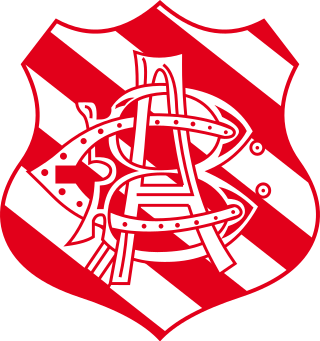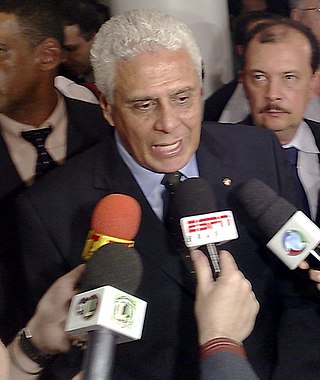| Season | 1979 | |
|---|---|---|
| ||
The year 1979 was the 78th season of competitive football (soccer) in Brazil.
| Season | 1979 | |
|---|---|---|
| ||
The year 1979 was the 78th season of competitive football (soccer) in Brazil.
Semifinals
| Team 1 | Agg. | Team 2 | 1st leg | 2nd leg |
|---|---|---|---|---|
| Coritiba | 2-3 | Vasco da Gama | 1-1 | 1-2 |
| Palmeiras | 3-4 | Internacional | 2-3 | 1-1 |
Final
Internacional declared as the Campeonato Brasileiro champions by aggregate score of 4-1.
( 1 )In 1979, two editions of the Rio de Janeiro State Championship were played because Guanabara State's and Rio de Janeiro State's football federations merged in 1978. The Rio de Janeiro State Football Federation organized both competitions, which were won by Flamengo.
| Competition | Champion |
|---|---|
| Copa São Paulo de Juniores | Marília |
| Competition | Champion |
|---|---|
| Taça Minas Gerais | Atlético Mineiro |
| Torneio de Integração da Amazônia | Rio Branco |
| Team | Copa Libertadores 1979 |
|---|---|
| Guarani | Semifinals |
| Palmeiras | Group stage |
The following table lists all the games played by the Brazil national football team in official competitions and friendly matches during 1979.
| Date | Opposition | Result | Score | Brazil scorers | Competition |
|---|---|---|---|---|---|
| May 17, 1979 | W | 6-0 | Éder, Zico (3), Nílton Batata (2) | International Friendly | |
| May 31, 1979 | W | 5-1 | Edinho, Sócrates (2), Nílton Batata, Éder | International Friendly | |
| June 21, 1979 | | W | 5-0 | Sócrates (2), Toninho, Zico (2) | International Friendly (unofficial match) |
| July 5, 1979 | | D | 1-1 | Juary | International Friendly (unofficial match) |
| July 26, 1979 | L | 1-2 | Roberto Dinamite | Copa América | |
| August 2, 1979 | W | 2-1 | Tita, Zico | Copa América | |
| August 16, 1979 | W | 2-0 | Tita, Zico | Copa América | |
| August 23, 1979 | D | 2-2 | Sócrates (2) | Copa América | |
| October 24, 1979 | L | 1-2 | Palhinha | Copa América | |
| October 31, 1979 | D | 2-2 | Falcão, Sócrates | Copa América |

Fluminense Football Club is a Brazilian sports club based in neighbourhood of Laranjeiras, in Rio de Janeiro, being the oldest football club in the state since its foundation in 1902. Competes in the Campeonato Brasileiro Série A, the first tier of Brazilian football, and the Campeonato Carioca, the state league of Rio de Janeiro. The word "fluminense" is the gentilic given to people born in the state of Rio de Janeiro, in Brazil.

The Campeonato Carioca, officially known as Campeonato Estadual do Rio de Janeiro, also commonly known as the Cariocão, is the state football league of Rio de Janeiro, Brazil. It is under the authority of the FERJ or FFERJ. It is an annual tournament, started in 1906.
The Torneio Roberto Gomes Pedrosa, also known as Taça de Prata, or nicknamed Robertão, was an association football competition contested in Brazil between 1967 and 1970 among soccer teams from São Paulo, Rio de Janeiro, Rio Grande do Sul, Minas Gerais and Paraná states. It was an important soccer tournament, being considered a predecessor to the Brazilian Championship induced in 1971. Thus in 2010 the Brazilian Football Confederation decided to consider the winners of the Robertão as Brazilian champions. The 1st edition of the tournament was organized by Federação de Futebol do Estado do Rio de Janeiro and Federação Paulista de Futebol.

America Football Club, usually abbreviated to America-RJ or simply America, is a Brazilian football team based in the city of Rio de Janeiro, in the northern neighborhood of Tijuca. The team compete in Campeonato Carioca, the top tier of the Rio de Janeiro state football league.

Bangu Atlético Clube, commonly known as Bangu, is a Brazilian professional association football club based in Rio de Janeiro, in the western neighbourhood of Bangu. The team plays in Série D, the fourth tier of the Brazilian football league system, as well as in the Campeonato Carioca, the top tier of the Rio de Janeiro state football league.

The Torneio Rio–São Paulo was a traditional Brazilian football competition contested between São Paulo and Rio de Janeiro teams from 1933 to 1966, in 1993 and from 1997 to 2002.
The Campeonato Carioca Série B1 is the football third level of the First Division annual competition among clubs in the state of Rio de Janeiro, Brazil. Usually, the champion of the level is promoted in the next season to the Campeonato Carioca. It is under the authority of the FERJ or FFERJ.
The Taça Guanabara is an annual football tournament attached to the Campeonato Carioca, the state football league in the Rio de Janeiro state. It has been organized since 1965 by the Rio de Janeiro State Football Federation. It has had different formats throughout its history.
Taça Rio is an annual football tournament attached to Campeonato Carioca, the state football league in the Rio de Janeiro state. It has been organized since 1982 by the Rio de Janeiro State Football Federation. It has had different formats throughout its history. Since 2021, it has been played between clubs that finished 5th to 8th in the Taça Guanabara.

Laranjeiras Stadium, officially named Manoel Schwartz Stadium, is a historic football stadium in Rio de Janeiro state, Brazil. The stadium holds 2,000 spectators. It was built in 1905 and is one of the oldest stadiums in Brazil. The stadium is owned by Fluminense Football Club.

Carlos Roberto de Oliveira, known as Roberto Dinamite, was a Brazilian footballer and politician. He was born in Duque de Caxias, Rio de Janeiro state. With a career as centre forward spanning over twenty years, Roberto is Vasco da Gama's player with the most appearances and all-time top goalscorer, as well as the overall leading scorer in the Brazilian Série A and the Rio de Janeiro State Championship. At the national level, Roberto Dinamite played in the 1978 and 1982 FIFA World Cups and the 1972 Olympic Games. He was president of Vasco da Gama from 2008 to 2014.

Fla–Flu is an association football derby between Flamengo and Fluminense, considered one of the biggest rivalries in Brazilian football. Their matches usually take place at the famous Maracanã Stadium, located near downtown Rio de Janeiro, in the Maracanã district. The Fla–Flu holds the world's record football match attendance of 194,603 people in a 1963 derby.

The 2000 FIFA Club World Championship was the inaugural FIFA Club World Cup, the world club championship for men's club association football teams. It took place in Brazil from 5 to 14 January 2000. FIFA as football's international governing body selected Brazil as the host nation on 8 June 1999 as the bid was found to be the strongest among four candidates. The draw was made at the Copacabana Palace in Rio de Janeiro on 14 October 1999. All matches were played in either Rio de Janeiro's Estádio do Maracanã or São Paulo's Estádio do Morumbi.
The Macaé Youth Cup was an under-17 football cup formed by Brazilian and international teams. The competition was organized by the Macaense Sporting League in association with the Rio de Janeiro Football Federation, and it ran from 1997 until 2009.
The 1971 Campeonato Brasileiro Série A was the 16th edition of the Brazilian Championship. However, from 1976 until 2010 this tournament was considered by the highest entity of national football as the first edition of the Campeonato Brasileiro Série A. The competition was won by Atlético Mineiro, thus winning its second Brazilian title.
The following article presents a summary of the 2002 football (soccer) season in Brazil, which was the 101st season of competitive football in the country.
The following article presents a summary of the 1953 football (soccer) season in Brazil, which was the 52nd season of competitive football in the country.
Taça do Atlântico was a national football team's competition held between 1956 and 1976 on an irregular basis, contested by the national football teams from South America.
Copa Río Branco was a national football team's competition set between 1931 and 1976 among the national football teams of Brazil and Uruguay. Brazil won the most competitions with 7 titles.

The São Paulo state football team represents São Paulo in association football.